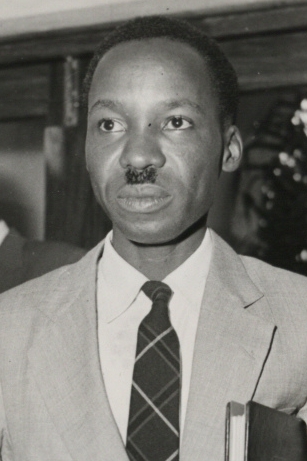
Julius Kambarage Nyerere was a Tanzanian anti-colonial activist, politician and political theorist. He governed Tanganyika as prime minister from 1961 to 1962 and then as president from 1962 to 1964, after which he led its successor state, Tanzania, as president from 1964 to 1985. He was a founding member and chair of the Tanganyika African National Union (TANU) party, and of its successor, Chama Cha Mapinduzi, from 1954 to 1990. Ideologically an African nationalist and African socialist, he promoted a political philosophy known as Ujamaa.
Ernest Wamba dia Wamba was a prominent Congolese academic and political theorist who became a commander of the Kisangani faction of the rebel Rally for Congolese Democracy during the Second Congo War.

Rashidi Mfaume Kawawa was the second Tanganyikan Prime Minister, Preceded by Julius Kambarage Nyerere from 22nd Jan 1962 to 9th Dec 1962 when the post was abolished and the first Tanzanian Prime Minister from 17th Feb 1972 to 13th Feb 1977, succeeded by Edward Sokoine.

Ujamaa was a socialist ideology that formed the basis of Julius Nyerere's social and economic development policies in Tanzania after it gained independence from Britain in 1961.
The Tanzania FA Cup is the top knockout tournament of the Tanzanian football.

Julius Nyerere International Airport is the international airport of Dar es Salaam, the largest city in Tanzania. It is located in Kipawa ward of Ilala District in Dar es Salaam Region of Tanzania. The airport has flights to destinations in Africa, Asia, Europe, and the Middle East. It is named after Julius Nyerere, the nation's first president.
Godfrey Mwakikagile is a Tanzanian scholar and author specialising in African studies. He was also a news reporter for The Standard — the oldest and largest English newspaper in Tanzania and one of the three largest in East Africa. Mwakikagile wrote Nyerere and Africa: End of an Era — a biographical book on the life of former Tanzanian President Julius Nyerere set in the backdrop of Africa's early post-colonial years and the liberation wars in the countries of southern Africa in which Nyerere played a major role.

Indian Tanzanians constitute a significant minority within the demographic landscape of Tanzania, with a population exceeding 60,000 individuals of Indian descent residing in the country. Many among them are traders and entrepreneurs, and despite forming only 0.2% of the population. they are considered by the Hindu Council of Tanzania to have disproportionate ownership of Tanzanian companies. Indians also have a long history in Tanzania, starting with the arrival of Gujarati traders, and they gradually came to control the trade in Zanzibar. Several buildings from that period still stand in Stone Town, the primary trading center on the island.
Dani Wadada Nabudere was a Ugandan academic, Pan-Africanist, lawyer, politician, author, political scientist, and development specialist. At the time of his passing, he was a professor at the Islamic University and executive director of the Marcus Garvey Pan-Afrikan Institute, Mbale, Uganda.

The National Museum of Tanzania is a consortium of five Tanzanian museums whose purpose is to preserve and show exhibits about the history and natural environment of Tanzania. The consortium developed from the National Museum of Dar es Salaam, established in 1934 by Tanganyika governor Harold MacMichael. Four more museums later joined the consortium, namely the Village Museum in Dar es Salaam, the National History Museum and the Arusha Declaration Museum in Arusha, and the Mwalimu Julius K. Nyerere Memorial Museum in Butiama.
Firoze Madatally Manji is a Kenyan activist.

Amir Habib Jamal was a Tanzanian politician and diplomat who served as a Minister under various portfolios in the Julius Nyerere administration. He represented the parliamentary constituency of Morogoro from 1960 to 1985, and was Tanzania's longest-serving Finance Minister and led the ministry for about 12 years.
Jeremiah Kasambala was one of the first ministers in the cabinet of Julius Nyerere after Tanganyika won independence from Britain on 9 December 1961. He rose to prominence when he was the head of the Rungwe African Cooperative Union in Rungwe District in the Southern Highlands Province.
African Consensus is an economic paradigm proposed in 2011 for sustainable development in Africa. It is built on practical experiences across the African continent together with shared experiences from other regions facing similar challenges. It merges existing efforts of civil society in such areas as renewable energy, community finance and empowerment, organic agriculture and water resource management, environmental and endangered species protection. It couples these with the pragmatic experiences of business and finance in an attempt to scale these efforts into viable economic models. Seeking a pragmatic path for development, it emphasizes the importance of heritage, cultural and identity protection with the need for economic advancement.

Tanzania–United Kingdom relations are bilateral relations between Tanzania and the United Kingdom. The United Kingdom has historically been a partner of Tanzania in many areas, particularly trade and security.
Barnabas Albert Samatta is a retired Tanzanian lawyer and judge who was Chief Justice of Tanzania from 2000 to 2007.
Augustine Saidi, or Augustino B. Saidi, was a Tanzanian lawyer who was the first African Chief Justice of Tanzania.
Rosemary Nyerere was a Tanzanian politician and academic. She was a daughter of the late Mwalimu Julius Nyerere, the founder and first president of the United Republic of Tanzania.
Mwalimu Nyerere University (MJNUAT), whose complete name is Mwalimu Julius Kambarage Nyerere University of Agriculture and Technology (MJNUAT), is a public university in Tanzania. MJNUAT focuses on the instruction of agricultural sciences, agricultural mechanization, and agribusiness.








